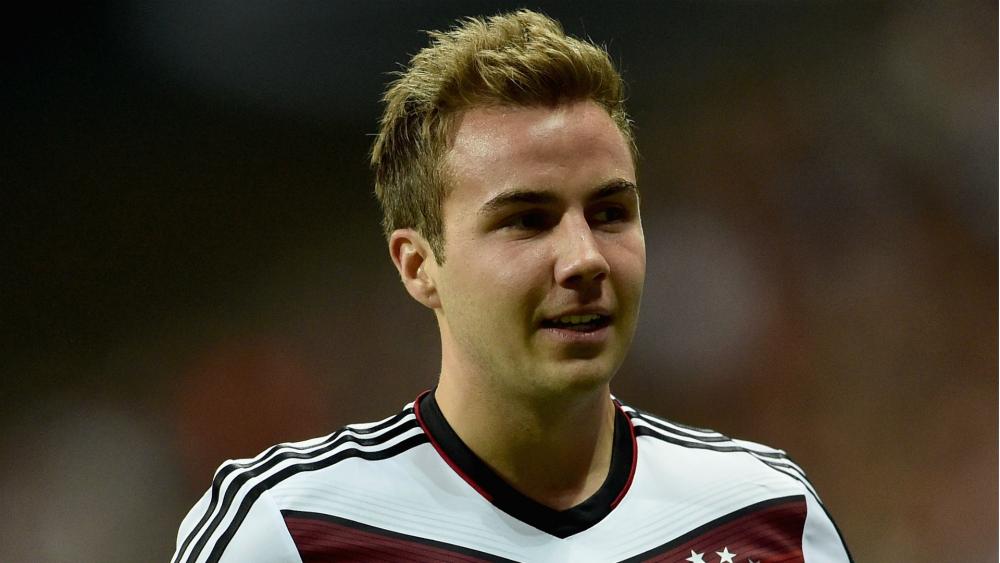Le Tournoi, 27 years on: When England last won a tournament
England triumphed at Le Tournoi de France against the big boys of world football – this is the story of that strange little competition over a quarter of a century later
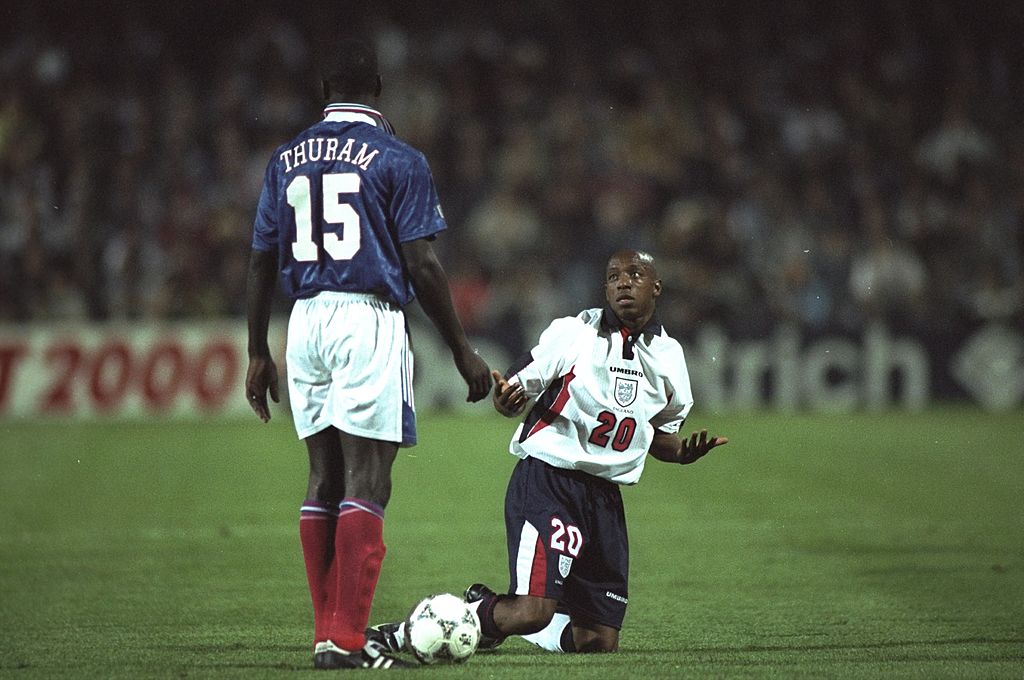
We’re not saying England’s fortunes have been dodgy over the past 58 years, but it says a fair bit that their solitary international tournament triumph outside Britain has essentially been condensed to 47 seconds on YouTube. Oh, and it doesn’t even feature any England players in it.
“Why not?” chuckles Andy Gray on co-commentary. “A 30-yard free-kick with a 20-yard run-up...” It was just a bit of fun really, as Roberto Carlos set his thunderous thighs whirring off towards Fabien Barthez’s goal. On the bench, France’s Frank Leboeuf asked team-mate Patrice Loko whether he had ever seen the Brazilian strike a ball. He hadn’t. “Just watch,” said Leboeuf.
What came next was genuinely mind-bending; a stunning act of force and skill that has since been analysed by physicians and replayed millions of times. As Roberto Carlos spanked the ball towards goal, fully two yards outside a post, it played chicken with a petrified ball boy before swinging back inside at the last minute, blowing a kiss at the woodwork on its way in. Brazil’s left-back had just scored the most famous free-kick of all time at 1997’s Tournoi de France.
These days, that much is remembered: the who, the when, the where of Bobby C’s missile. But what about the why? Why did four of the world’s finest international sides face off in a random summer tournament, irking even some of those involved? How did it offer an ominous insight into the future, in more ways than one? And, most importantly of all, how did England actually manage to win the thing?
“I’ve still got the shirts – I don’t keep many, but I’ve still got those,” Rob Lee smiles to FFT. “Oh, and the medal.” The former Newcastle midfielder is trying to jog his memory about events that took place many years ago, but there is one thing that springs to mind quickly.
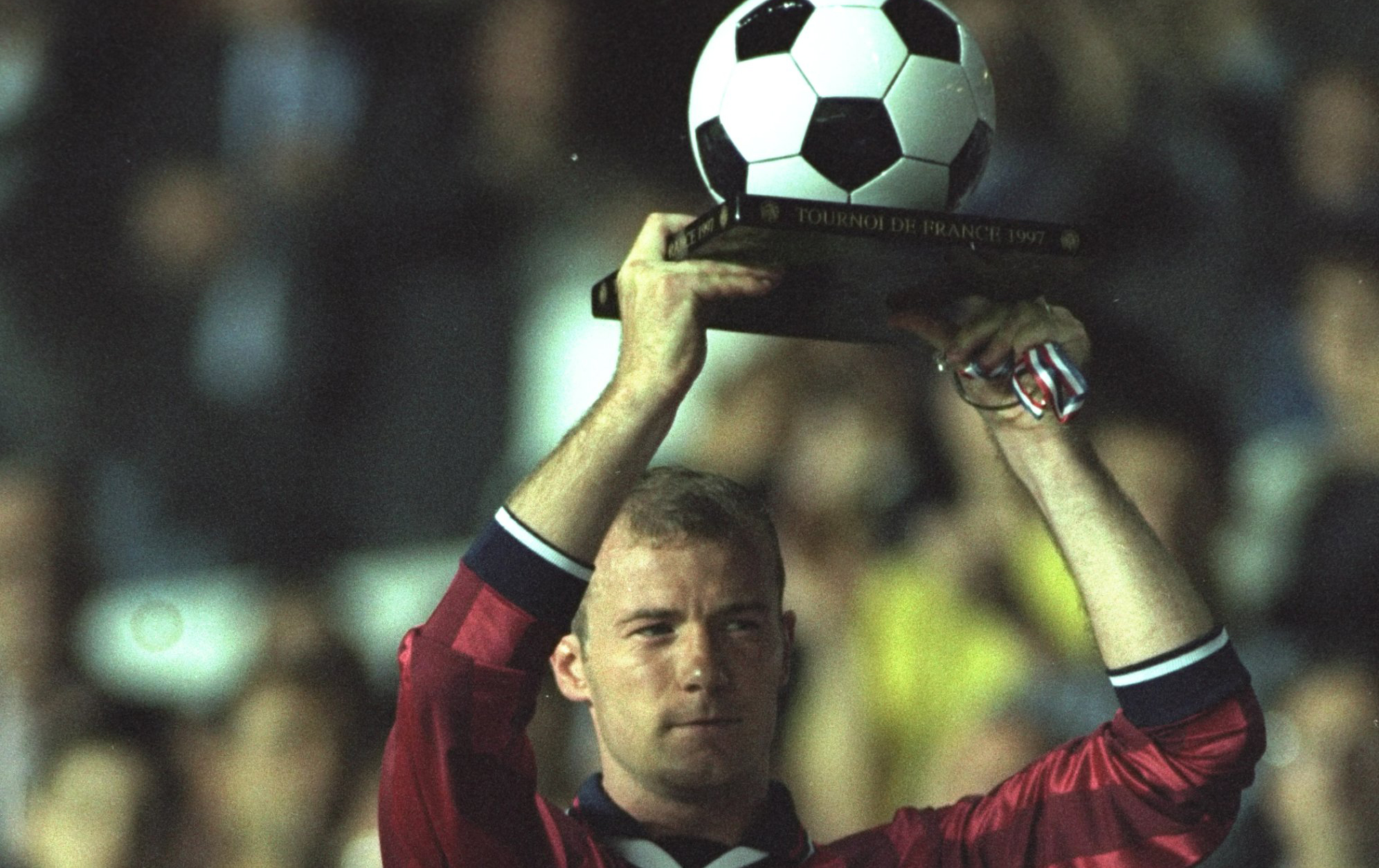
“The trophy!” he says. “Was Alan [Shearer] even smiling when he held it aloft?” Lee is reminiscing about what must be the lamest international trinket ever; a clipart-inspired generic football prize that would have been more at home presented to the champions of an under-eights tournament. “I vaguely remember seeing it on a pencil case my son had once,” continues Lee, who played in two of the three matches. “Weirdly, though, it’s a picture I’d like to have – we actually did win something…”
And he’s right: Le Tournoi is still the last glory England’s national team laid claim to – assuming we’re not getting all misty-eyed over the 2004 FA Summer Tournament that featured Japan and Iceland at the City of Manchester Stadium, that is. (How could you forget that?) It came at a crucial juncture for Glenn Hoddle’s Three Lions, wedged between the agonising high of Euro 96 and a year of cautious optimism before the 1998 World Cup, a tournament for which they had yet to qualify and still faced their hardest fixture to reach. Ranked 13th in the world, below the likes of Mexico, Russia and Romania, England were out to prove they were far more serious contenders than that. The quietly developing crop, melding 30-somethings with several Manchester United-schooled starlets, were playing for pride too.
Get FourFourTwo Newsletter
The best features, fun and footballing quizzes, straight to your inbox every week.
For their three opponents that summer, the circumstances were mixed. In the days when FIFA’s Confederations Cup was customarily staged in Saudi Arabia, Le Tournoi acted as something of a dry run for France’s hosting of the following year’s World Cup – matches were played in four cities (Paris, Nantes, Lyon and Montpellier), with some stadia still under construction. At Lyon’s Stade de Gerland, for example, a jazzy pop art mural depicting 32 legends was erected behind one goal while work took place – inevitably it caused some controversy, as icons like Franz Beckenbauer and Brazil’s then-coach Mario Zagallo were left off. Ticket prices were also a source of contention, ranging from 250 Francs to an eye-watering 500 (£28-£56) for England’s matches, at a time when the cheapest entry to watch a national game at Wembley cost £22 (around £41.52 today).
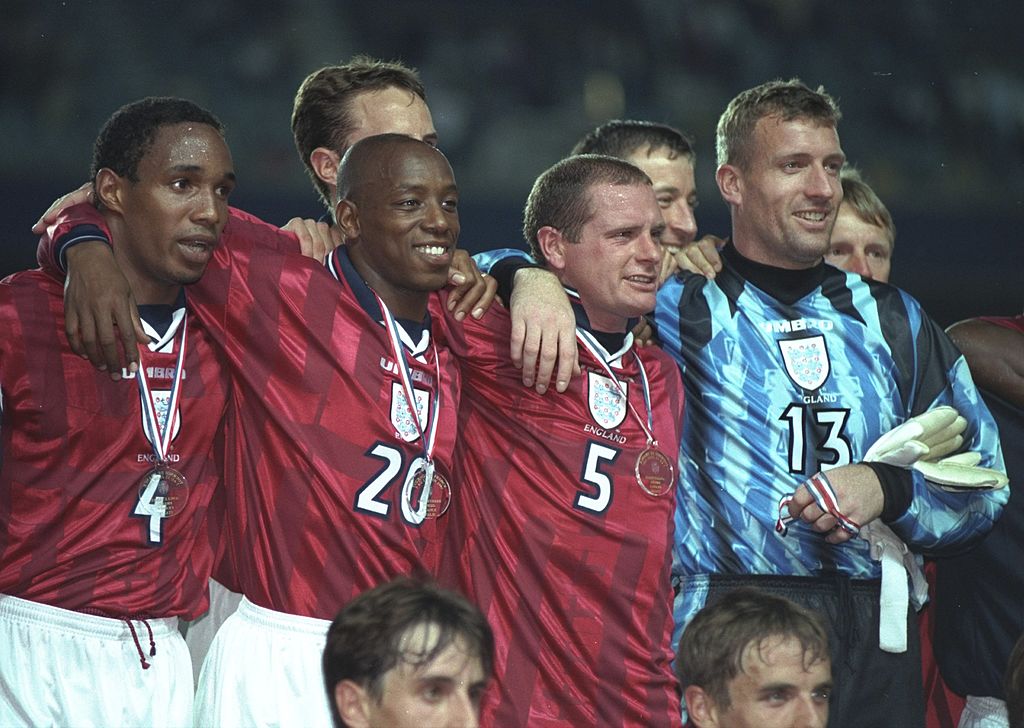
With Serie A’s season having only finished two days earlier, Italy boss Cesare Maldini was furious at the Azzurri’s mere presence – so much that it was reported they’d even considered dropping out for a hefty fine. Brazil were more relaxed – understandably so, given they’d already qualified for France 98 as defending champions. A strong team had just been beaten 4-2 by Norway, though, in a busy calendar year that would ultimately serve up 24 Selecao showdowns.
In short, England’s adversaries were there for the taking. “We went straight there after a really good victory in Poland [in World Cup qualifying],” says Lee. “I’d say the tournament was understated, but we were up against the three best teams in the world and I think it was quite important to see how we’d get on against them.”
Having taken over from Terry Venables after the Euros, Hoddle’s record read: played eight, won seven, lost one – to their opening Tournoi foes Italy, who’d squeaked a 1-0 Wembley victory in World Cup qualifying a few months earlier. Something good was forming under the ex-Chelsea manager.
“Glenn was brilliant – coaching-wise he was the best I ever had,” says Lee. “Tactically, he was so good. He introduced a back three and played three in midfield instead of a 4-4-2. He was probably one of the first to do that – we only played 4-4-2 at Newcastle. He used David Beckham as a wing-back and gave us some more options in midfield – I’d started with Paul Ince and Gazza against Poland. Glenn wasn’t as good a man-manager as he was a coach, but I loved him.”
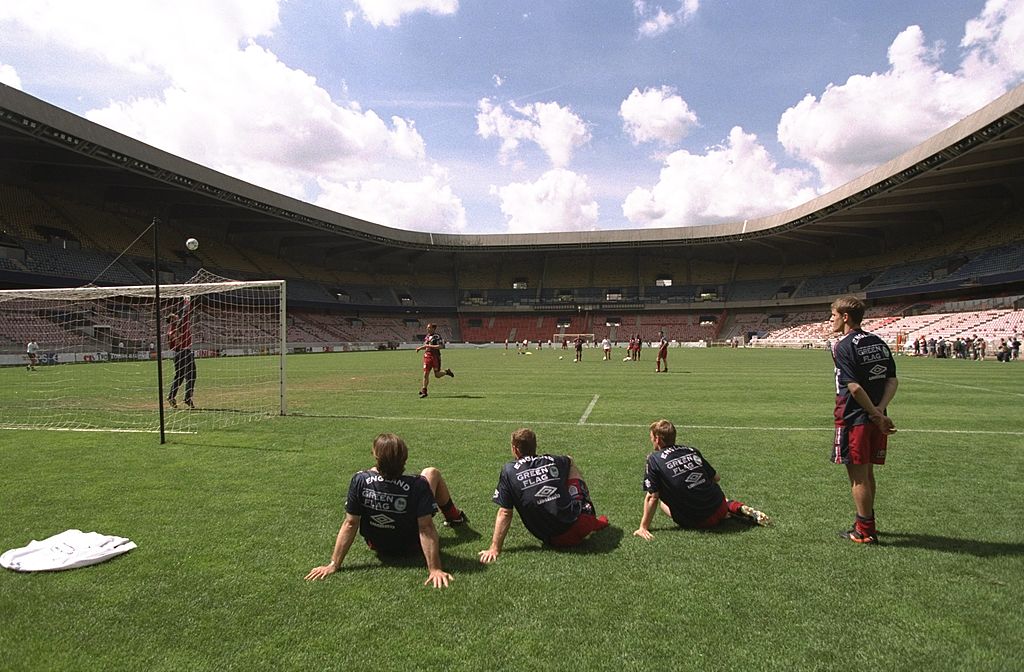
Hoddle, however, was forced into a slight pre-tournament rethink. He’d planned to use Jamie Redknapp as a Matthias Sammer-style sweeper until injury struck, so turned to Aston Villa’s 26-year-old Gareth Southgate instead.
After Roberto Carlos’ thunderbastard for the ages was cancelled out by Marc Keller’s second-half leveller for France in the opening game, England lined up against the Italians in Nantes. Lee, almost fully fit after breaking a toe, missed out and in stepped a 22-year-old Paul Scholes for his first Three Lions start. “I remember watching him from the bench thinking, ‘Oh my god, I won’t have very long left after this’,” winces Lee.
With Shearer rested and Robbie Fowler out of the squad through injury, a 33-year-old Ian Wright got the nod upfront. The Arsenal marksman had been left out in the cold at international level from October 1994 until Hoddle’s arrival, but rattled home the opener inside 26 minutes after Scholes’ tremendous lofted ball from deep. Two minutes before the break, roles were reversed when Wright squared for the pint-sized prodigy to lash in a fine left-footed strike past Angelo Peruzzi. Playing alongside club-mate Becks in central midfield, Scholes ran the show.
Media lapped up the 2-0 victory, England’s first against the Azzurri in 20 years and five attempts. Six matches into Maldini’s reign, Italy had finally conceded their first goals. The Guardian’s David Lacey luxuriated over “one of the most stylish performances seen from an England side since Ron Greenwood’s team went to Barcelona shortly before the 1980 European Championship and defeated Spain”. La Gazzetta dello Sport took it… less well. “England played for the result while Italy played to entertain, then beat France with robbery in the last minutes,” they hissed.
England’s 86th-minute winner against the hosts in their second encounter was indeed anything but pretty; Shearer’s 11th goal in 11 international matches came after Barthez fumbled Teddy Sheringham’s harmless cross, giving the Three Lions their first success on French soil since 1949. It was Les Bleus’ first home defeat full stop since their infamous USA 94 qualifying loss to Bulgaria, and served to highlight their struggles at the sharp end – looking back, Aime Jacquet’s options read like a puzzling Who’s Who, with emphasis on the ‘who?’: between them, forwards Florian Maurice, Nicolas Ouedec, Christophe Dugarry and Loko had managed a meagre 10 goals in 55 games combined. And people wonder how Stephane Guivarc’h went on to become a World Cup winner.
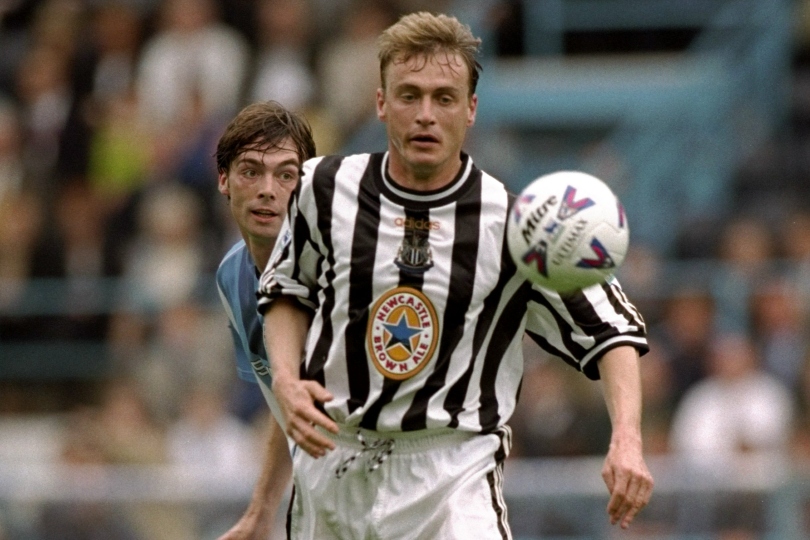
It was also Paul Gascoigne’s 50th cap, one year out from his infamous omission from Hoddle’s World Cup squad. “He was the best I ever played with,” says Lee. “But I suppose it was also around this time when plenty of other very good players were coming into the squad and he wasn’t our focal point any more.” Gazza’s performance against France was a sign of things to come – in a wasteful display, he was lucky to escape a yellow card for a poor challenge on Patrick Vieira’s shins.
Beckham wasn’t so lucky. After picking up an injury courtesy of Vieira, the 22-year-old hobbled a few yards to the sidelines to get treatment, shrugging off the referee’s request to board a stretcher for his ludicrously short trip. The booking that followed ruled him out of the final game against Brazil.
“Beckham will have learned a lesson and Hoddle too – suspensions can upset the best-laid plans,” mused the Independent’s Ian Ridley, with a frightening sense of foreboding. We’ll forgive you a wistful sigh.
Still, Hoddle’s charges were on their way to Tournoi glory after only two encounters; the following evening, Italy and Brazil played out a belting 3-3 draw – comedy own goals from Aldair and Attilio Lombardo sandwiched an Alessandro Del Piero brace, before the South Americans secured a point thanks to their glorious ‘Ro-Ro’ combination in the final 20 minutes. Ronaldo, days from becoming the planet’s most expensive footballer with Inter, jinked away to slot home a typically effortless first, then superbly spotted strike partner Romario in a chaotic penalty box. That clever late equaliser made England the champions.
When Hoddle’s side faced the world’s top-ranked team in their closing encounter then, confidence was running high. In an attempt to play down their star-studded opponents, Hoddle himself had even scoffed before the game that “sometimes people give Brazil too much respect, as if they’re from another planet”. England’s poor history against their previous opponents hadn’t hurt them, which was just as well, given their record against Brazil was even worse, with only three wins in 18 attempts dating back to 1956.
That soon became three in 19 thanks to an expert 60th-minute toe-poke from Romario – facing England for the first time in his career, and only just returned to the Selecao squad in February after a near three-year hiatus. It ended the Three Lions’ six-match win streak, but did little to knock them off their stride.
If England’s final game proved something of a damp squib, however, France’s curtain-drawing clash against Italy was anything but. Even Gazzetta would have admired the stonking goals from Zinedine Zidane and Youri Djorkaeff that gave the hosts a 2-1 lead going into the dying embers. Better still for the prickly pinksheet, though, Del Piero’s 89th-minute penalty – his second spot-kick of the tournament – earned Maldini’s men a point in Paris and himself the Golden Boot ahead of Romario.
In reality, there’s no great legacy to the Tournoi de France beyond Roberto Carlos and his freakish mastery of a football. Ultimately, England won and followed it up by topping their France 98 qualifying group ahead of the Azzurri, having ground out a famous goalless draw against Zola, Cannavaro & Co in Rome’s Stadio Olimpico that October.
But after bagging the undesirable Fair Play Awards at both Italia 90 and Euro 96, the Three Lions’ table-topping batch of yellow cards in ’97 thrilled Hoddle, who responded to questions with a smug retort. “I’ll tell you how I’m going to answer that,” he stated. “It’s nice not to win the Fair Play Award but to win the tournament.”
With hindsight, the irony hurts – not least considering a) Beckham’s seminal red card as England lost to Argentina on penalties in the last 16, and b) the fact Hoddle’s side still shared the Fair Play prize yet again at France 98 anyway. It still rankles for Rob Lee.
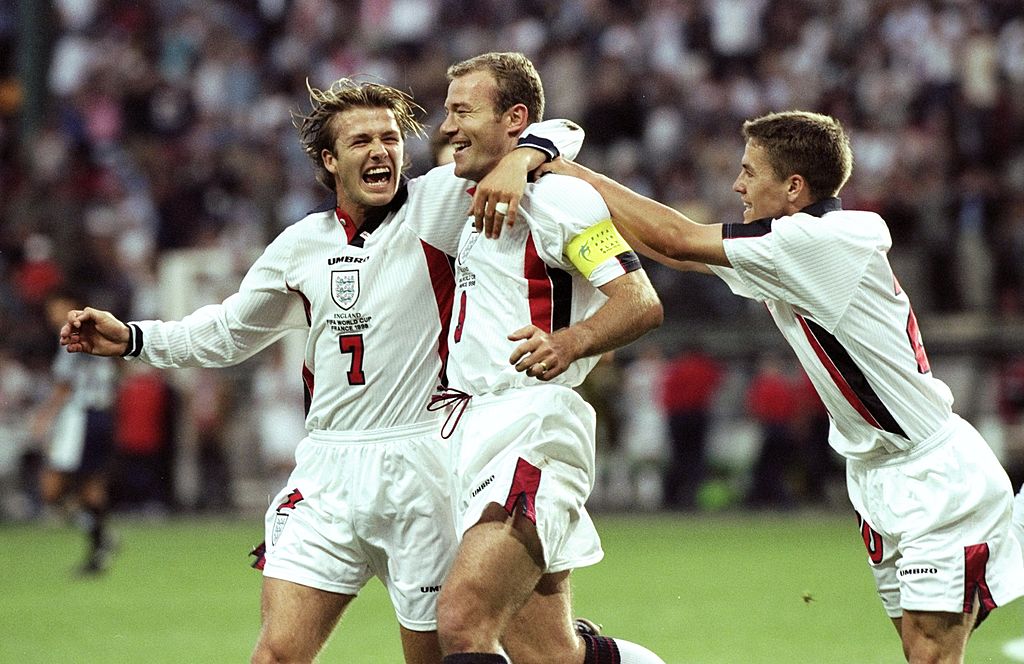
“I must admit, I thought we had a good enough squad to win that tournament – and I think Glenn did as well,” he explains. “We had some bloody good players. It was just disappointing that we ran into Argentina so early, really – we should have got a result against Romania in Toulouse, which meant we’d have met them a little bit later down the line. Then there was the sending-off [for Beckham] of course, as well as Sol Campbell’s disallowed goal.
“What I eventually learned in football is that sometimes, regardless of how good you are, you need some luck. I don’t think things ever do go England’s way, do they? There’s always something that crops up. Hopefully with the team we’ve got now, we’ll get that bit of luck and win something.”
Twenty-seven years ago, though, England did win something. It might not have been big, it might not have meant anything – but for nine sunny days in June 1997, it sure was bloody good fun.
Le Tournoi II: the petition starts here...
This piece on England at the 1997 Tournoi originally appeared in the July 2022 issue of FourFourTwo magazine – subscribe now!
More stories
Quiz! can you name every member of the Tournoi squad that England had in '97?
Meanwhile, we've since asked Roberto Carlos to tell us about that free-kick in his own words.
When David Beckham was the most hated man in England – and had the greatest season of his life
Joe was the Deputy Editor at FourFourTwo until 2022, having risen through the FFT academy and been on the brand since 2013 in various capacities.
By weekend and frustrating midweek night he is a Leicester City fan, and in 2020 co-wrote the autobiography of former Foxes winger Matt Piper – subsequently listed for both the Telegraph and William Hill Sports Book of the Year awards.

